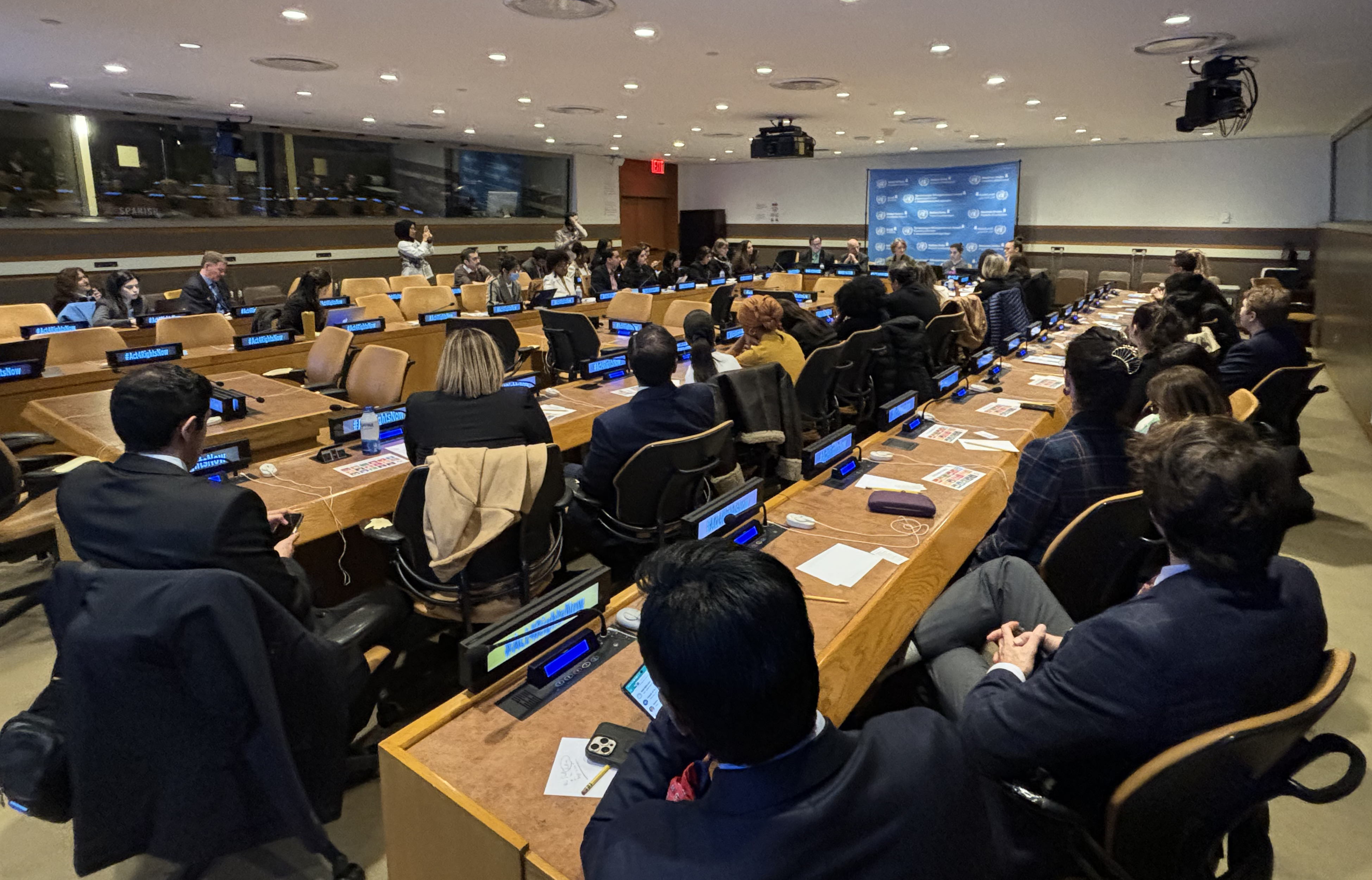Hooper, 18, a sophomore at Lehigh’s College of Health, was selected as a speaker at the United Nations headquarters in New York City
Rhema Hooper ‘26 has long been passionate about the protection of children in war zones and the dangers of child labor practices in cobalt mining and elsewhere. This week, she got the opportunity to speak out about those causes on a global stage.
Hooper, 18, a sophomore at Lehigh University’s College of Health (COH), was chosen as a speaker during a United Nations event about the role of higher education in advancing human rights. Entitled “Making the Universal Declaration of Human Rights a Reality: The Role of Higher Education,” the event was held at the U.N. headquarters in New York City on Dec. 4.
“I urge the global academic community to emphasize research investigating possible solutions for more efficient mining practices, recycling of mined materials,” Hooper said during her speech. “And just as importantly, I encourage universities to include more curriculum regarding hazardous conditions and child labor in artisanal and small-scale mining.”
Hooper’s speech was made possible by a long-standing partnership between Lehigh University’s United Nations Partnership and the United Nations Academic Impact (UNIA). The LU/U.N. Partnership regularly provides opportunities for the Lehigh community to attend U.N. conferences, meet with ambassadors, pursue U.N. internships, and much more.
“It gives me hope for the next generation when I see students like Rhema present, not only so eloquently, but the depth to which they embrace their cause,” said Bill Hunter, Director of Fellowship Advising and U.N. Programs at Lehigh. “Very quickly, Rhema has gone from a cause that she personally embraced, to a cause that she’s now advocating for on a global level.”
Advocating Against Child Labor
 Hooper is studying for a BA in community and global health, with a minor in molecular biology, and ultimately intends to pursue medicine as a practicing physician at refugee camps in Southwest Asia and North Africa. Her studies are specifically focused on the endangerment of children in war zones, cobalt mining practices in the Democratic Republic of Congo, and child advocacy and antimicrobial resistance in sub-Saharan Africa.
Hooper is studying for a BA in community and global health, with a minor in molecular biology, and ultimately intends to pursue medicine as a practicing physician at refugee camps in Southwest Asia and North Africa. Her studies are specifically focused on the endangerment of children in war zones, cobalt mining practices in the Democratic Republic of Congo, and child advocacy and antimicrobial resistance in sub-Saharan Africa.
During her speech, Hooper noted that everyone uses electronic devices like cellphones, laptops, computers, and tablets. However, she asked the audience to be mindful of what type of raw materials those devices require, and who is risking their lives to mine the raw minerals needed to power them.
“With the hope of the progress made and currently underway, let us utilize our education in this technologically expanding era, to ensure that our global transition to sustainable technologies is indeed equitable for all,” Hooper said during her speech, which was also broadcast around the world on UN Web TV.
From 2016 to 2020, the number of children working in child labor grew by 8.4 million, and the International Labour Organization reported in 2020 that 160 million children – nearly 1 in 10 globally – participate in child labor, Hooper said in her speech.
Focused on Health Equity
More than two dozen Lehigh students from various majors, minors, and concentrations have spoken at the U.N. over the past year through the LU/U.N. Partnership, Hunter said. Hooper is the first COH student to do so, other than members of the partnership’s U.N. Youth Representative Program, a year-long commitment for participating Lehigh students.
Hooper was recommended by Krista Liguori, Assistant Professor with the Department of Community and Population Health.
“Rhema’s passion for child rights and ethical mining is impossible to ignore,” Ligouri said. “She highlights this under-examined problem so concisely and emphatically in conversations with students and faculty alike, and is continuously making the connections between what we learn in class and how she can apply it in her research and ultimately make an impact.”
This event relates directly to COH’s focus on advancing health equity by approaching health comprehensively, collaborating across disciplines to address health from root cause to solution, while embracing community as a cornerstone of their work.
COH students go on to a variety of professions, not limited to medical school, such as working with non-governmental organizations to manage global health programs, working in data analytics in hospitals, and even health entrepreneurship. The College prepares students for careers of advancing health equity around the world.
Discovering a Global Lens
Other speakers at the event included U.N. officials, human rights experts, and faculty members from various higher education institutions. Hooper was one of only four college students selected to participate, each of whom advocated for human rights for different communities.
Hooper, who grew up in Southern California, first developed an interest in global advocacy as a 7-year-old child, when she spent three weeks in Japan with her family on gospel missions. They taught Black gospel music to citizens of Tokyo, which culminated in a concert featuring a 500-person choir.
“Having that experience at age 7 really taught me how to have a global lens. That experience shaped me so much,” said Hooper, who cited her father’s encouragement to participate in debate tournaments starting at age 12 as another formative factor in her future advocacy.
“Let us remember – not only this week, but every day of our lives – that human rights belong to all of us,” said Omar Hernández, UNIA program manager. “... We all have to do our part to make human rights and the provisions of the Universal Declaration of Human Rights a reality for all of us.”